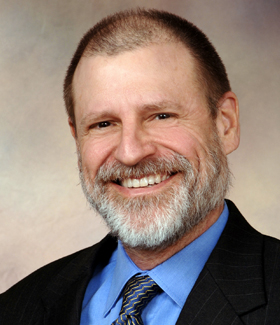
Trotter Hardy
Professor of Law, Emeritus
Email: [[thardy]]
Full resume: here (.pdf in new window)
Areas of Specialization
Intellectual Property Law--Copyright Law
Representative Professional Activities and Achievements
Joined the faculty in 1982. Clerked for Judge John D. Butzner, Jr. of the U.S. Court of Appeals for the Fourth Circuit and was Leo Goodwin Distinguished Visiting Professor at Nova Southeastern University Law School. Served as Scholar in Residence and Technical Advisor to the Register of Copyrights, U.S. Copyright Office during 1996. Taught at the Catholic University of Portugal in Lisbon as a Senior Fulbright Scholar in the spring of 2009. Associate Dean of Technology since 2000.
Author of articles in the University of Chicago Legal Forum, the University of Pittsburgh Law Review, the Tulane Law Review, the Nova Southeastern University Law Review, the University of Akron Law Review, the University of Dayton Law Review, Business Law Today, the Journal of Legal Education, the Richmond Journal of Law and Technology, the Journal of the Copyright Society of the U.S., and the Harvard Journal of Law and Technology.
Scholarly Publications
Books
- The Effect of Electronic Mail on Law Teaching and Law Practice (edited transcript of an electronic conference) (Wm. S. Hein Co 1994).
- Software Tools: A Building Block Approach (NBS Special Publication 1977) (500-14 (co-author; principal author of the publication and sole author of chapter 3, pp. 12-26)).
Articles and Book Chapters
- OECD, Transborder Data Flows in 1987 Yearbook of Law, Computers and Technology, School of Law at the Leicester Polytechnic Leicester, England.
- Criminal Copyright Infringement, 11 Wm. & Mary Bill Rts. J. 305 (2002).
- The Copyrightability of
New Works of Authorship: 'XML Schemas' as an Example, 38 U. Houston. L. Rev. 855 (2001). - Not So Different: Tangible, Intangible, Digital, and Analog Works and Their Comparison for Copyright Purposes, 26 U. Dayton L. Rev. 211 (2001).
- Copyright and 'New-Use' Technologies, 23 Nova S.E. U. L. Rev. 657 (1999).
- Computer RAM 'Copies:' Hit or Myth? Historical Perspectives on Caching as a Microcosm of Current Copyright Concerns, 22 U. Dayton L. Rev. 423 (1997).
- Get Off My Site: Applying the Ancient Doctrine of Trespass to 'Property' on the Internet, 12 (1997) (a condensation of "The Ancient Doctrine of Trespass to Web Sites," 1996 J.Online L. art. 7, listed under Legal Publications, above).
- Property (and Copyright) in Cyberspace, 1996 U. Chi. Legal F. 217 (1996).
- Review of Hibbitts's 'Last Writes?', 30 Akron L. Rev. 249 (1996).
- Starting An Electronic Journal in Law, 3 The Journal of Information, Law and Technology 1 (1996) (September). Online.
- Limiting In-Line Link Liability, Va. B. Ass'n News & Views 8 (1996) (with Marshall M. Curtis).
- The Ancient Doctrine of Trespass to Web Sites, 1996, art. 7 J. Online L. (November) (1996). Online.
- Cyberspace and Censorship: A Personal Choice, San Francisco Examiner (1995) (invited column).
- Contracts, Copyright and Preemption in a Digital World, 1 Rich. J.L. & Tech 2 (1995). Online.
- An Experiment with Electronic Mail and Constitutional Theory, 44 J. Legal Educ. 446 (1994).
- The Proper Legal Regime for 'Cyberspace', 55 U. Pitt. L. Rev. 993 (1994) (cited in Religious Technology Center v. Netcom On-Line Communication Service, Inc., 907 F. Supp. 1361n.1 (N.D.Cal. 1995)).
- Creating an Expert System for Legislative History Research: Project CLEAR's 'Lexpert', 85 Law Libr. J. 239 (1993).
- Electronic Conferences: The Report of an Experiment, 6 Harv. J.L. & Tech. 213 (1993).
- Using the Internet for an Electronic Conference, 2 Law Tech. J. (1993) ((University of Warwick, U.K.).
- The Policy, Law, and Facts of Copyrighting Computer Screen Displays: An Essay, 11 Computer L.J. 371 (1992).
- Using A Hypertext System for Legal Research Education, in Law, Decision-Making, and Microcomputers: An International Perspective (S. Nagel, 1991).
- Why Legal Research Training Is So Bad: A Response to Howland and Lewis, 41 J. Legal Educ. 221 (1991).
- Project CLEAR's Paper Choice: A Hypertext System for Giving Advice About Legal Research, 82 Law Libr. J. 209 (1990).
- The Copyright Doctrine of 'Works Made for Hire', 37 Va. Law. 28 (1988).
- An Economic Understanding of Copyright Law's Work-Made-for-Hire Doctrine, 12 Colum.-VLA J. L. & Arts 181 (1988) selected for reprinting in the Intell. Prop. L. Rev., final issue, 1989.
- Copyright Law's Concept of Employment - What Congress Really Intended, 35 J. Copyright Soc'y U.S.A. 210 (1988) (cited by the Supreme Court in CCNV v. Reid, 109 S.Ct. 2166, 2173 n.7 (1989)).
- When Doctrines Collide: Corporate Negligence and Respondeat Superior When Hospital Employees Fail to Speak Up, 61 Tul. L. Rev. 85 (1986).
- A Response to Gregg Williams's 'A Threat to Future Software', 4 13 (1986).
- Six Copyright Theories for the Protection of Computer Object Programs, 26 Ariz. L. Rev. 845 (1985).
- Transborder Data Flow: An Overview and Critique of Recent Concerns, 9 Rutgers Computer & Tech. L.J. 247 (1983).
- The Syntax of Interactive Command Languages: A Framework for Design, 12 67 (1982).
- System Implementation and Evaluation, 24 24 (1973).
Other
- Project Looking Forward: Sketching the Future of Copyright in a Networked World, Report written under contract to the U.S. Copyright Office (1998). Online.
- Law and the Internet, Bus. L.Today, 1996, at 8 (March/April).
- Guidelines for the Development of Patent and Copyright Policies by State-Supported Institutions of Higher Education, State Council of Higher Education for VirginiaM/b> (1987) (principal drafter and editor).
- Resolved: That the American Tort Claims System Needs to be Reformed in View of the Liability Crisis, Portfolio Mag., Sept. 16, 1986, at 5.